The FGC Research and Practice Network is funded through a research grant from the National Institute for Health and Care Research as part of a national project entitled:
Family and Group Conferencing in adult social care and mental health: exploring how it works and what difference it can make in people’s lives.
The Principal Investigator is Professor Jerry Tew at the University of Birmingham.
On this page you will be able to find:
The research will run from November 2022 to July 2025.
It will focus on:
The research is led by Professor Jerry Tew at the University of Birmingham with colleagues from the universities of Birmingham, Edinburgh, Cardiff, Sheffield and the London School of Economics, researchers with lived experience of social care and health services and colleagues from the field of practice.
Research Fellow: Sharanya Mahesh, University of Birmingham
Family and Group Conferencing (FGC) is a relatively new approach in adult social care. It offers an inclusive approach in which people can plan for their care and support on their terms – and which can mobilise the strengths and resources that may potentially exist within people’s family and social networks. It can also be used where there are safeguarding concerns or where people may require support for their decision making. It therefore fits well with wider policy and practice developments around strengths-based practice
Originating in New Zealand, FGC has become established as a practice in Children and Family services in the UK. It involves bringing together an individual with family and/or members of their social network in order to decide on a plan whereby to resolve a current difficulty or challenge – e.g. around organising support, enabling recovery or ensuring safety. It is facilitated by an independent co-ordinator and comprises 3 stages:
i) preparatory work with the individual and each family/network member to elicit their involvement and help them to establish what they each want out of the process;
ii) the Conference itself which usually starts with information sharing and discussion with any professionals involved before there is ‘private family time’ in which the individual and family/network members share ideas and decide on a plan, and
iii) subsequent review meeting(s) to check out how the plan is working and adapt it if appropriate.
A number of local evaluations of adults and mental health FGC services have been conducted in the UK, and FGC has also been included in wider studies of family inclusive and preventative approaches in adult social care. Overall, findings have tended to be positive, and a consistent finding is that FGC can enable people to resolve difficulties relating to care and support arrangements – often by mobilising support arrangements that involve a wider ‘circle of support’ and/or by resolving issues between people which had made it harder for them to pull together. Plans devised by the person and their network can reduce or delay the need for more costly and intensive service provision, or can employ care services in ways that are more acceptable and empowering. In general, there are strong indications that the approach can be more effective when offered ‘upstream’ when difficulties are first emerging, rather than being used as a last resort.
Many individuals and families have reported that they were empowered by the process (putting them ‘in the driving seat’), and that, following the FGC process, the individual had a better quality of life with a wider network of social capital and support. Mechanisms of change may, in some instances, include mobilising and remobilising social networks, the opportunity to restore damaged or estranged interpersonal relationships, or to increase understanding within them (including the sharing of shameful experiences). However, there can also be concerns that FGC processes – and ownership by the individual with support from their family/network – could become subverted by a professional system that, directly or indirectly, seeks to set the agenda for the Conference process.
The first phase of the research has involved using an online survey to scope current services and planned service developments across the UK, how practice models are evolving, and to whom services are being offered. We have also reviewed the international literature relating to FGC for adults in order to develop a preliminary understanding of how FGCs work, who do they work best for and in what contexts, and what are seen as the sorts of outcomes that may be achieved by having FGCs.
Following on from this we will conduct interviews with key informants in order to gain a deeper understanding of how services are working. At the end of this process, we will be hosting a Deliberative Forum to firm up an initial Programme Theory that sets out:
The second phase of the research will involve tracking the experience of samples of individuals and their family/social networks as they receive FGC services in 3 research sites where there are relatively well-established FGC services for adults and/or mental health. This will include both those that proceed to having a conference and those that do not (for whatever reason). Alongside this, there will be an analysis of costs and consequences (including subsequent use of social care and health services) as against a matched comparator group receiving ‘service as usual’.
We will use the findings from this research to inform a consensus consultative process, using a Delphi methodology, to refine our Programme Theory as to what are the key mechanisms and contextual factors that are important in underpinning an effective FGC process for adults. This will then be used as the basis for developing fidelity criteria, refining practice guidance and developing service standards.
If you would like to find out more about the research project and associated activities
please subscribe to the discussion forum on the Jiscmail platform at https://www.jiscmail.ac.uk/FGC-ADULTS . This is an inclusive forum for practitioners, researchers, people with experience of services, and anyone else with an interest in Family and Group Conferencing for Adults. This will give you access to information, resources and invitations to participate in networking events – and the opportunity to communicate with a wider community of practice. The forum is co-hosted by Community Catalysts and the research team. Information for Jisc subscribers is at https://www.jiscmail.ac.uk/help/subscribers.html
If you wish to make direct contact with the research team, you can contact us at FGC-ADULTS@JISCMAIL.AC.UK.
This document sets out an initial outline of the practice model (s) of FGC for adults in the UK, what sorts of outcomes may be achieved, and key components, in terms of contexts and processes that may increase the likelihood of achieving these outcomes.
Programme theory is the articulation of the relationships between contexts in which a practice takes place, possible mechanisms and the likelihood of achieving particular outcomes. each programme theory statement proposes a set of causal links which maps out the various pre-conditions that may have to be in place for positive outcomes to be achieved.
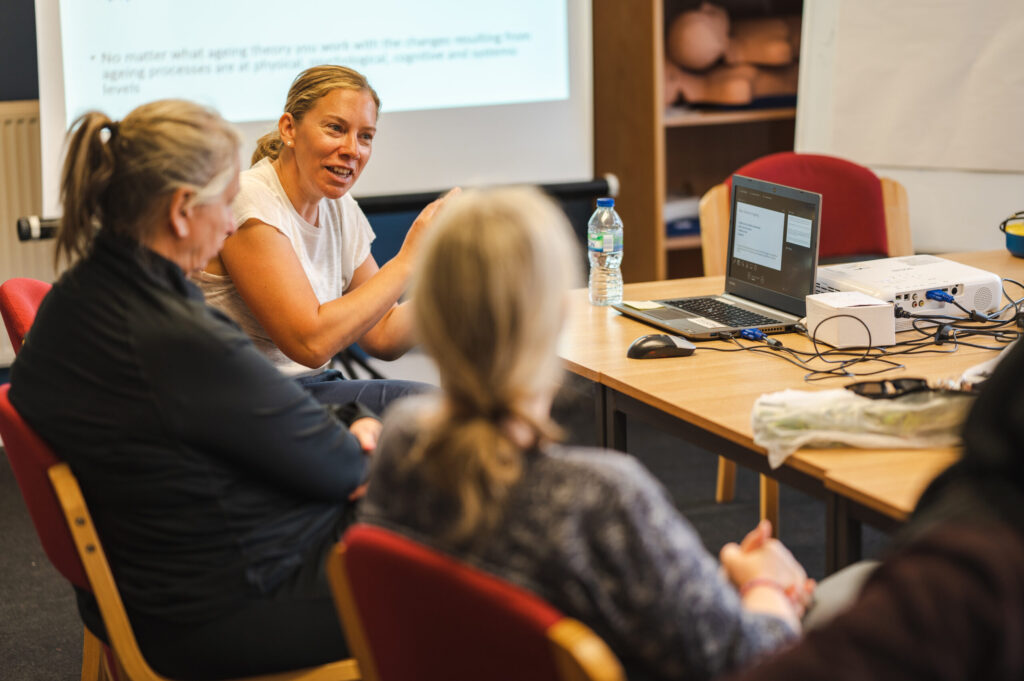
Crowndale Centre, Camden – Thursday 7th September 2023
In the Deliberative Forum, we invited a range of people with knowledge and experience in relation to Family and Group Conferences to check out and take forward our emerging understanding of how FGCs for adults work, and what differences they can make in people’s lives. Most importantly, this included people with experience of having a conference, as well as co-ordinators, managers and those who may refer people to FGC services.
During the forum, we shared both, what we thought we know from our analysis of the literature, results from a national survey and stakeholder interviews, and what we had identified as key questions where we needed to understand things better. We asked participants to deliberate on these questions in small groups. Out of this, we will distil our current best understanding – or Programme Theory – as to how FGCs work. In particular we were interested in
We have summarised what we think we already know and captured the collective wisdom that came out of our deliberations in the Report of our discussions – and we also have a selection of short videos as people fed back from their groups.
We will develop and test out or initial Programme Theory for FGC for adults in the next stage of our research by tracking the experience of a sample of people and their networks across our different research sites.
Here is the full report –Family and Group conferences for adults – summary report of the Deliberative Forum process
If you would like to contribute your thoughts or feedback, please email Sharanya Mahesh on s.n.mahesh@bham.ac.uk or join the discussion on our online forum by subscribing to Jiscmail- https://www.jiscmail.ac.uk/FGC-ADULTS. You can set up an account by simply clicking on the link provided. This platform is also used to connect with others who are interested in FGCs for adults, initiate discussions on relevant topics or to ask questions relating to FGC research and practice.
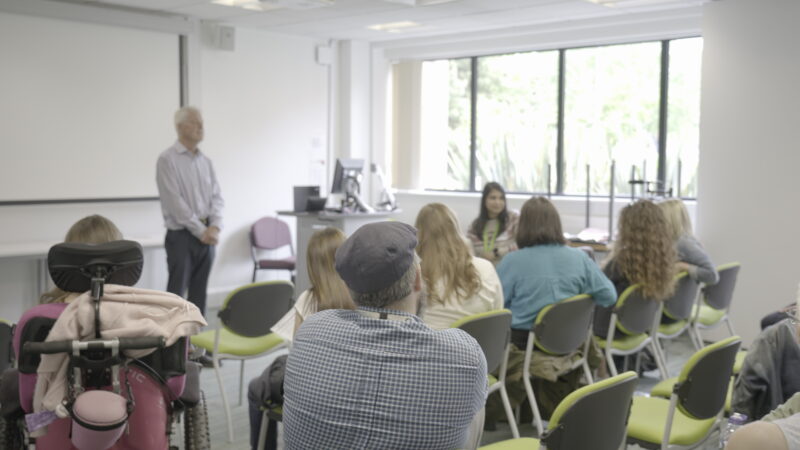
The event brought together some familiar faces and quite a number of new ones – all with a shared interest in sharing and learning together about current practice across the UK. It was particularly exciting to welcome practitioners from two localities in Scotland, a London Borough developing a new service, people with lived experience of FGCs and participants from the voluntary sector (Community Catalysts, Daybreak Family Group Conferences and Alzheimer’s Society).
For the benefit of those who were not able to attend (and those who were), we are uploading a range of material from the Day – videos, presentations and photos. Watch this space!
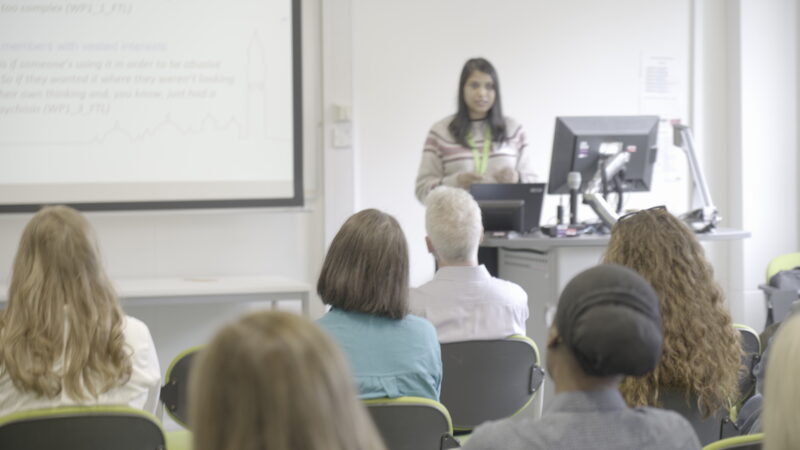
In the morning, members of the University of Birmingham research team presented on the findings from the national survey and stakeholder interviews (Sharanya Mahesh), and our current best characterisation of the adults’ FGC practice model and its underpinning Programme Theory (Jerry Tew). Programme Theory provides a mapping of the sorts of outcomes that may be achieved by FGC, how it works (mechanisms and processes), and contextual factors that are likely to support positive outcomes.
There was discussion of key values, including how not to compromise the independence of coordinators, especially given the pressure (sometimes) to step in and fill gaps where social workers or social care practitioners should really be providing the relevant back-up or support. The idea of FGC as a ‘courageous conversation’ had strong resonance with those present. Incorporating some final tweaks based on the feedback received, the characterisation of the adults’ FGC practice model, and its underpinning Programme Theory, is now available.
The afternoon featured a series of presentations and discussions around current practice and practice issues.
Sean Ahern and Maria Smith from Camden presented a fascinating story of how Dennis was encouraged and supported to have a Conference to bring together the people who were important to him, and could help to give more consistent support in enabling him to have a safer and more rewarding life in his older age – but in a way that respected who he was and the life that he had led.
Michaela Calvert presented a deeply insightful account of her own experience of having a FGC, how this had changed things for her and what she had learned from this. Crucial to her had been how the process levelled power hierarchies and brought everyone together (professionals and network members) as part of her circle – and how this enabled her to find her voice at the centre (in her supportive chair that was specially transported in to the venue).
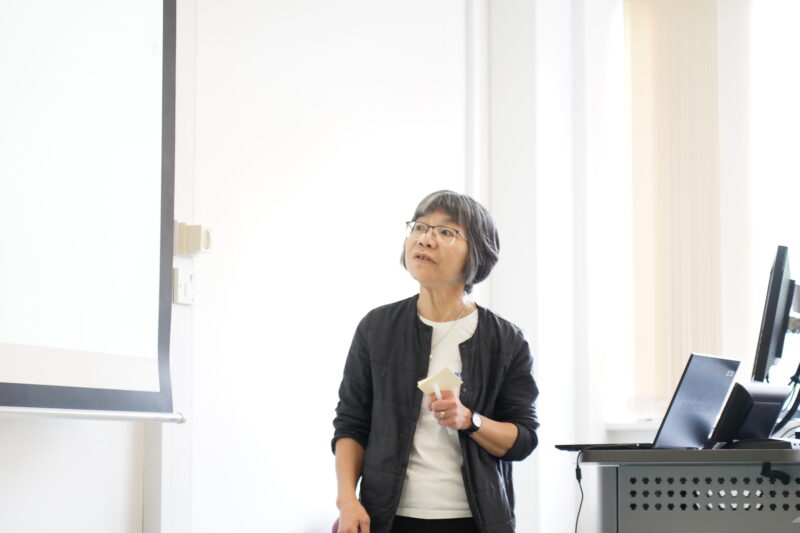
Annie Ho (independent social worker) presented her reflections based on her experience of Court of Protection cases and Safeguarding Adults Reviews (SAR). These tend to be situations where the person at the centre may lack capacity to articulate their wishes and preferences, and in which there can be deeply entrenched family relationship issues and/or disagreements between network members and professionals. These can cause great harm to those involved and result in huge costs to network members and/or wider professional systems (including legal costs). Could a FGC process offer a more restorative opportunity to air and resolve differences and reach a degree of accommodation and shared understanding around the needs of the vulnerable adult? A relatively small investment could potentially reap great benefits for those involved and also prevent futile expenditure of time and money on things that do not actually help the person at the centre.
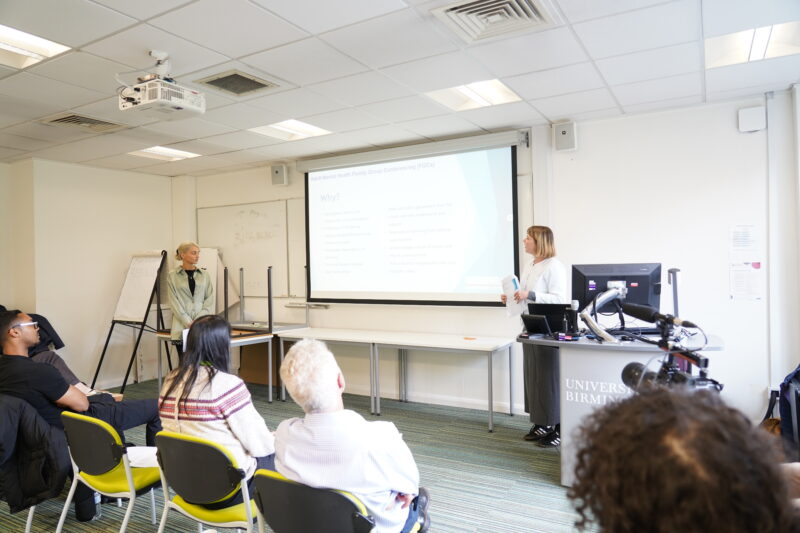
Alivia Bray and Yasmin Morgenstern from Essex presented on how they have adapted and developed Family Group Conferencing in an adult mental health service. There is much about FGC that can be somewhat counter-cultural in an NHS setting where decisions are usually made by clinicians rather than the person and their network. What was particularly interesting was the time that goes into working with the person during the preparation phase in order to support them in developing their own personal recovery plan which is confidential to them. It is then for the person to decide what of this they wish to share with their network and practitioners in the FGC process. This reverses the conventional power relations of clinical practice and puts the person in the ‘driving seat’ of their recovery process, alongside the people that matter to them.
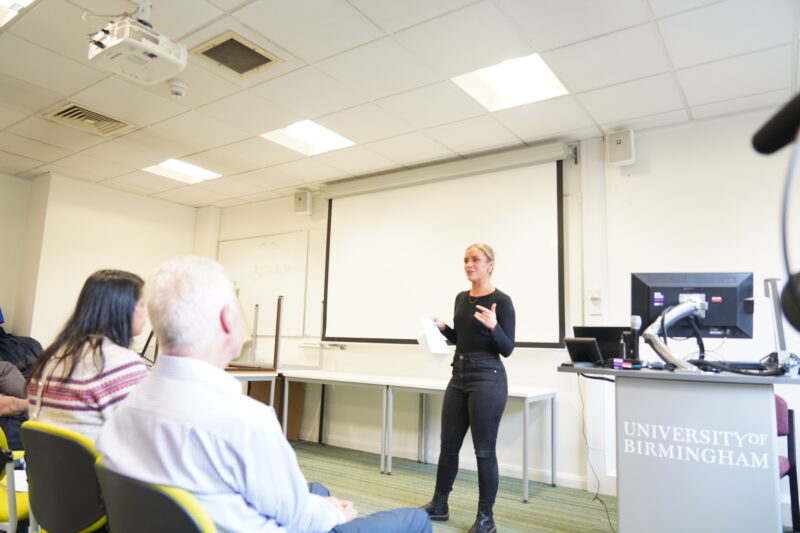
Danielle Valente from Birmingham outlined their plans for integrating FGC practice within the Transitions Service for young people with ongoing support needs as they move from receiving support from children’s to adults’ services. A particular issue can be enabling parents and family members to adjust to the young person becoming an adult – and the implications of this in terms of how they go about supporting their loved-one through their adult life, and offering recognition to them as a person who will be directing their own life as far as possible.
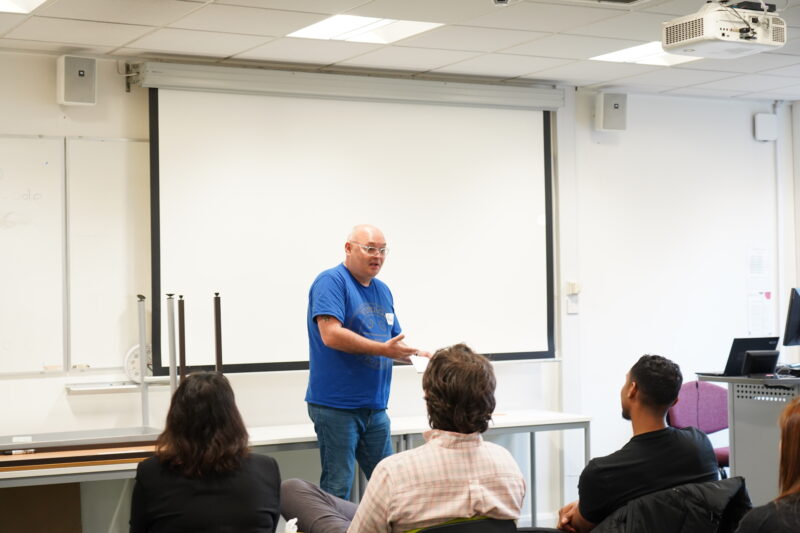
Paul Allen (also from Birmingham) rounded off the afternoon session by reflecting on a particular conference process and some of the issues that this raised in terms of the conversations that go into preparation. This highlighted the importance of the coordinator managing the ‘space’ for conversations to take place, but being comfortable living with the uncertainty as to what outcome may emerge from these.
A short video of the Research and Practice Network Event held at the University of Birmingham on 14th May 2014